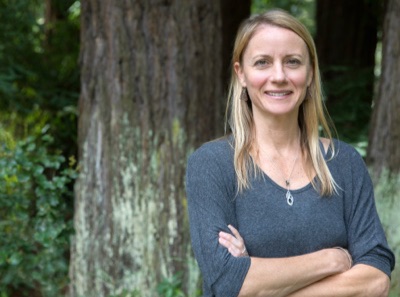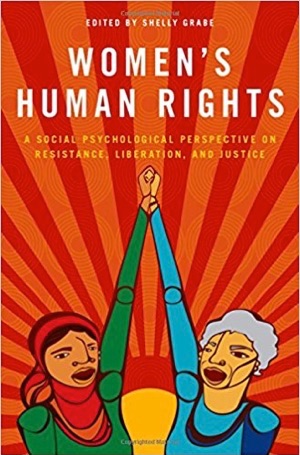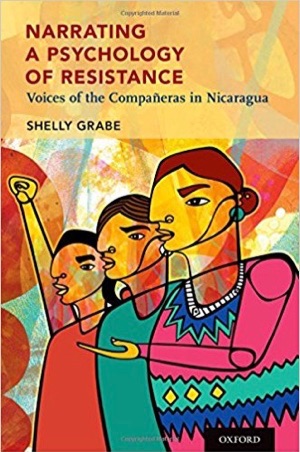As a clinical psychologist working in the juvenile court system, Shelly Grabe was eager to help youth. She wanted to make a lasting difference in their lives. But she felt like she was doing little more than putting a Band-Aid on a gaping societal wound.
That's when a fateful trip to Nicaragua in 2005 changed her life. Grabe, now an associate professor of psychology, met women who were organizing to fight domestic violence, and she saw what real and lasting social change looked like.
These women were combatting domestic violence by helping women claim ownership of land to which they were entitled. Becoming property owners empowered the women, and that had ripple effects: rates of domestic violence dropped, the women asserted their rights to birth control, and they began to raise their daughters differently, insisting they attend school.
Grabe was captivated by the social psychological benefits of what was, in essence, a human rights campaign. "As one woman put it, she felt like she went from being property to owning property," said Grabe.
Feeling compelled to document the profound social change that was unfolding before her eyes, Grabe secured a $9,000 research grant and proceeded to interview more than 300 women—the kind of large-scale, data-collection effort the World Health Organization undertakes with hundreds of thousands of dollars, Grabe points out now, her laughter tinged with irony.
Strikingly, Grabe noted that the social transformation wasn't rooted in the economic value of the land, most of which was not productive agricultural land. Rather than greater economic well-being, owning property gave the women greater status—personal and social.
The women in Nicaragua were organizing at a grassroots level to enforce property-rights laws that had been on the books since the 1979 revolution. "It's not unlike pay-equity laws in the United States," noted Grabe. "The law can be on the books but nobody follows it."
Using land ownership as a structural indicator of gender inequity, Grabe documented a greater sense of "agency" among women property owners. "It shifts the gender ideology and changes assumptions about women's roles," she said. "Women talk about themselves differently, and husbands respect their wives more."
As a social psychologist, Grabe explores the links between social and political conditions that determine how, why, and under what circumstances resistance emerges. If her career path had unfolded more traditionally, Grabe said she might have chosen sociology rather than psychology, which takes an "individual focus rather than a structural one" to phenomena like domestic violence. But social psychology allows her to focus on the impact of social structures on individuals, and she has carved out a niche for herself in what she calls the "sub field" of feminist psychology.
"That's why UC Santa Cruz was such a perfect fit for me," she said. "Nobody else would hire a psychologist looking at land use! The department gave me a long leash and said 'Go for it.' "
Grabe has overcome challenges in the field, including the language barrier. She doesn't speak Spanish well enough to conduct in-depth interviews, so she hired local women, which is in keeping with her commitment to participatory research.
"I was upfront about my shortcomings—I don't speak Spanish, I don't have expertise in Latin American history or politics, and I don't have a background in feminist studies," she said. But what she brought to the project was a determination to "follow" the grassroots activists and document their work, letting them set the agenda rather than impose her own research program on the community.
Word of her scholarship, and her research approach, has traveled around the globe. Members of a grassroots organization in Tanzania engaged in a similar land-rights effort reached out to Grabe, who has documented reductions in violence against women there, too—despite significant cultural differences, including a pastoral system and polygamy.
A year ago, Grabe published Narrating a Psychology of Resistance: Voices of the Compañeras in Nicaragua (Oxford University Press, 2016), which presents first-hand accounts from members of the Nicaraguan women's movement.
"Humans are complex beings, and our psychological responses to sociopolitical oppression can lead to gendered justice that brings about lasting social change," said Grabe. "It's important to recognize and understand that phenomenon if we want a more just and equitable world."
In November, Grabe followed that book with the edited volume, Women's Human Rights: A Social Psychological Perspective on Resistance, Liberation, and Justice (Oxford University Press, 2017). Contributing authors, including Grabe's colleague Heather Bullock, a professor of psychology who specializes in economic justice, write about violations of women's human rights that occur around the world—rape, sexual orientation, homelessness, civic participation, violence—to highlight the relevance of psychology to the defense of women's rights.
The book represents a "radically different approach to women's rights" than the typical legal framework, Grabe writes in the introduction. By using social psychological theory as a framework to defend women's human rights, it provides a path to understand how violations operate—and, importantly, offers strategies that extend beyond changing laws or monitoring international human rights treaties.
As a "scholar-activist," Grabe takes satisfaction in having documented the ways in which women working at the grassroots level have resisted marginalization and implemented social change. Demonstrating the efficacy and transformational power of their work has been personally and professionally gratifying, and she looks forward to growing the community of scholars who are building what she calls a "feminist psychology of resistance."





